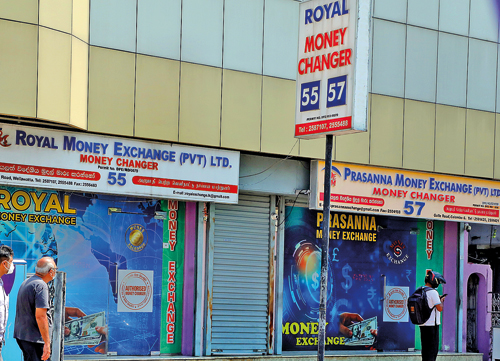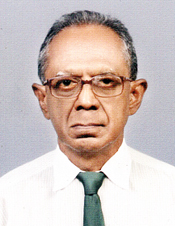Ways of mitigating Sri Lanka’s dollar crisis

File picture of a money changer shop.
Since it is reported that Sri Lanka (SL) has less than US$2 billion in its reserves, immediate action has to be taken to prepare a plan to earn the dollars required and for the country to alleviate poverty.
Long term action to overcome the absence of political stability and good governance to establish an enabling environment for growth
The country had by 2019 attracted a stock of only $13 billion of foreign direct investment (FDI) while a tiny country like Singapore had attracted a massive stock of $1.7 trillion in the same year. The reasons for this is that foreign investors have been avoiding SL due to the fear that acts of terrorism will be repeated creating political instability, while there has also been widespread corruption (see table below) as well as the poor international reputation of the country due to being accused of human rights violations. The absence of political stability in turn is due to the failure on the part of the leaders of the majority community to listen to the grievances/ requests of the Tamil minority community for equal rights leading up to the Sinhala Only Act of 1956, followed by the 30-year war. Nevertheless FDI is essential to expand production capacity as SL does not save enough capital, does not have sufficient technologies to add value to goods and services and has little knowledge of global market destinations for product and service exports.
The country has to reverse this failure by changing its Constitution and related laws to accommodate the rights and requests of the minority communities. This has to be done for example by implementing the recommendations of the Lessons Learnt and Reconciliation Commission (LLRC) 2011, as well as including proposals to improve good governance, after reaching a consensus with all the political parties/other stakeholders to create an enabling environment for building the capacity especially to increase employment and production for export expansion by attracting investment particularly FDI.
The required changes to the Constitution are detailed in an article published in the Economic Journal to be launched by the Sri Lanka Economic Association and in a forthcoming book. It appears to be certain that if the Constitution is not revised on these lines SL may never be able to alleviate poverty and reach prosperity. However, if the Constitution is changed to bring about reconciliation among the various communities and good governance/democracy, foreign investors may change their minds while the international reputation of the country would also improve significantly.
 In addition SL has to adopt a market oriented social market economic policy (in addition to fiscal stability i.e. balancing the government budget) instead of socialist economic policies followed only by failed states like Venezuela, Cuba and North Korea in addition to improving productivity and global competitiveness.
In addition SL has to adopt a market oriented social market economic policy (in addition to fiscal stability i.e. balancing the government budget) instead of socialist economic policies followed only by failed states like Venezuela, Cuba and North Korea in addition to improving productivity and global competitiveness.
Short term action to obtain immediate
relief and prepare for medium term
and long term action
Since SL’s foreign reserves have reached rock bottom, the government has to immediately go for a long term low interest International Monetary Fund (IMF) loan instead of going around on bended knees for short term high interest commercial loans which add to the existing external debt of $47 billion. This will enable the government to overcome the crisis to earn time to go for medium and long term action.
Medium Term Action

Mr. Lloyd F. Yapa
Certain types of direct action in the medium term are necessary to attract foreign investments especially to build up reserves until an enabling environment for rapid growth is created by revising the Constitution. These are areas which have to be promoted intensely especially by the Board of Investment (BOI) and the foreign embassies of SL to add greater value to products and services, as most of them possess special features that may attract foreign investors. They are as follows:
a) The ports and related infrastructure due to the central location of SL on East West trade routes;
b) Minerals resources such as apatite, graphite and a commodity such as cinnamon due to their high quality and quantity as well as petroleum deposits and ocean resources such as fisheries around the island; the exploitation of most of these high value minerals have been handed over to state-owned enterprises which continue to export them in the primary form enabling importers to add value to them and earn billions of dollars at SL’s expense;
c) Backward and forward linkages of export sectors such as tea and garments, especially to add value to products and services to earn higher prices;
d) The value chain of the tourist sector and establishment of a brand as a country with one of the most beautiful natural environments in the world.
In addition, it is essential to drastically simplify red tape e.g. setting up of a One Stop Shop with the BOI for approval of foreign investment proposals quickly (see table above regarding rankings with regard to Ease of Doing Business) as there have been reports that an investor from one of the East Asian countries had failed to obtain approval for an investment project even after visiting the country 45 times, several expatriate Sri Lankan investors had been turned away by the complexity of procedures linked with corruption, there has been harassment of such investors who have established projects in the country by local politicians with demands for various favours while there are reports that unreasonable requests have also been made from foreign investors even by government ministers.
The above mentioned Ease of Doing Business ranking apparently does not take into account procedures at lower levels of the public service such as Pradesheeya Sabhas (PS); a person known to me had waited for 18 years to get approval from a certain PS to set up a farm on state owned land! There are other problems which include contending with the numerous labour laws, difficulties of obtaining land and skilled labour, dealing with low quality infrastructure facilities and the incorrect public statements to the effect that the authorities are ‘selling valuable national assets’, referring to the sensible attempts of the government at attracting foreign investments to certain existing state owned facilities like the ports. These constraints to investment have to be quickly overcome, correct tender/ approval procedures have to be followed when calling for investments and most importantly the public has to be educated as to how SL benefits from such investments.
Conclusion
As the country’s foreign reserves have reached rock bottom and the economy is near bankruptcy, there is no point in going around trying to obtain more short term loans at commercial rates. The only feasible option is to go to the IMF immediately to obtain long term relief at a low interest rate. This will allow SL time to take long and medium term action to prepare an enabling environment for realising rapid economic growth especially by revision of the Constitution for establishing political stability and good governance that will make it possible for a massive inflow of FDI to SL. Without waiting for such inflows, SL could also take medium term action to promote certain areas which have unique features that could attract FDI while simplifying complex procedures for Ease of Doing Business, adopting social market economic policies (along with fiscal stability) that emphasise on improving productivity and global competitiveness all of which have allowed most of the East Asian economies to prosper.
(The writer is a Development Economist).
Hitad.lk has you covered with quality used or brand new cars for sale that are budget friendly yet reliable! Now is the time to sell your old ride for something more attractive to today's modern automotive market demands. Browse through our selection of affordable options now on Hitad.lk before deciding on what will work best for you!


